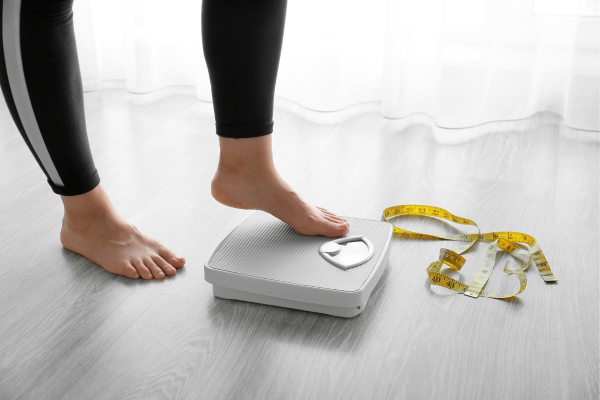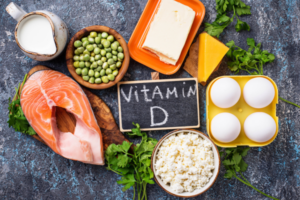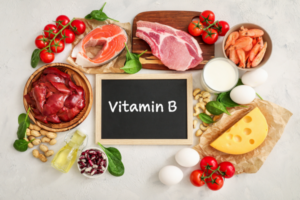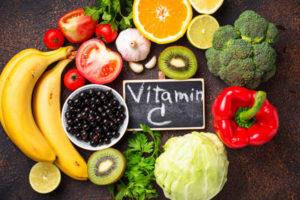
Which Vitamins Help with Weight Loss?
August 30, 2024
Losing weight can be a challenging journey, often requiring a combination of diet, exercise, and lifestyle changes. However, an often overlooked factor in weight management is the role of vitamins. Certain vitamins can significantly support your weight loss efforts by boosting metabolism, regulating appetite, and improving energy levels. In this article, we’ll explore which vitamins help with weight loss, focusing on the benefits of Vitamin D, B Vitamins, Vitamin C, and Magnesium. You’ll learn how these vitamins contribute to weight management and how to incorporate them into your routine for optimal results.
Which Vitamins Help with Weight Loss? A Guide
Understanding Metabolism: How Vitamins Contribute
Metabolism is the engine that powers your body’s ability to burn calories and manage weight. Vitamins play a crucial role as cofactors in metabolic processes, helping to convert food into energy. Without adequate vitamin intake, your metabolism can slow down, making it harder to lose weight. Vitamins ensure that your body’s metabolic pathways function efficiently, supporting steady weight loss.
Foods Slowing Your Metabolism
Energy Production: Fueling Your Weight Loss Journey
Vitamins are essential for energy production, which is vital for maintaining an active lifestyle and burning calories. B Vitamins, in particular, are known for their role in converting carbohydrates, fats, and proteins into energy. By ensuring you have sufficient levels of these vitamins, you can boost your energy levels, stay active, and enhance your weight loss efforts.
Appetite Regulation: Vitamins and Hunger Control
Certain vitamins influence the hormones and neurotransmitters that regulate hunger and satiety. For example, Vitamin D plays a role in managing leptin, a hormone that signals when you’re full. Adequate levels of Vitamin D can help prevent overeating by promoting a sense of fullness, making it easier to stick to a healthy eating plan.
Fat Oxidation: Breaking Down Fat Stores
Vitamins also contribute to the process of fat oxidation, where stored fat is broken down and used for energy. This process is crucial for weight loss, as it helps reduce body fat. Vitamin C, for instance, enhances the body’s ability to burn fat during physical activity, making it an important nutrient for those looking to shed pounds.
Which Vitamins Help with Weight Loss? Vitamin D and Weight Loss

What is Vitamin D?
Vitamin D is a fat-soluble vitamin that is essential for various bodily functions. It is best known for its role in maintaining bone health by aiding calcium absorption, but its benefits extend far beyond that. Vitamin D also supports immune function and helps reduce inflammation, both of which are important for overall health and weight management.
Deficiency Prevalence
Vitamin D deficiency is surprisingly common, affecting millions of people worldwide. Factors such as limited sun exposure, darker skin tones, and certain medical conditions can all contribute to low Vitamin D levels. This deficiency is associated with a range of health issues, including an increased risk of weight gain and difficulty losing weight.
How Vitamin D Aids in Weight Loss
“A study found that supplementing with 50,000 IU of Vitamin D per week for six weeks led to significant reductions in BMI, weight, and waist circumference among obese and overweight women aged 20–40 years. Additionally, Vitamin D levels in the participants increased notably compared to the control group.” Khosravi, Z. S., et al. (2018). Effect of Vitamin D supplementation on weight loss in obese and overweight women: A clinical trial. International Journal of Preventive Medicine, 9, 63. https://doi.org/10.4103/ijpvm.IJPVM_329_15
Metabolic Enhancement
Studies have shown that Vitamin D can enhance metabolic rate, helping the body burn calories more efficiently. By boosting metabolism, Vitamin D supports weight loss and helps prevent the accumulation of fat.
Insulin Sensitivity
Improving insulin sensitivity is another way Vitamin D supports weight loss. When your body is more sensitive to insulin, it can manage blood sugar levels more effectively, reducing fat storage and promoting the use of glucose for energy.
Inflammation Reduction
Chronic inflammation can hinder weight loss and contribute to weight gain. Vitamin D helps reduce inflammation in the body, creating a more favorable environment for weight loss and overall health.
Sources of Vitamin D for Weight Loss
Sunlight Exposure
The body synthesizes Vitamin D when the skin is exposed to sunlight. Spending time outdoors, especially during midday when the sun is strongest, can help boost your Vitamin D levels naturally. However, factors like geographic location, skin type, and sunscreen use can affect how much Vitamin D your body produces from sunlight.
Dietary Sources
Vitamin D can also be obtained from certain foods. Fatty fish such as salmon and mackerel, egg yolks, and fortified foods like milk and orange juice are good sources of Vitamin D. Including these in your diet can help you meet your daily Vitamin D needs.
Supplements
For those who struggle to get enough Vitamin D from sunlight and food, supplementation may be necessary. Vitamin D supplements come in various forms, including D2 and D3, with D3 being more effective at raising and maintaining adequate levels in the body. It’s important to consult with a healthcare provider to determine the right dosage for your needs.
Which Vitamins Help with Weight Loss? B Vitamins and Weight Loss

Overview of B Vitamins
Introduction to the B Vitamin Complex
The B Vitamin complex is a group of eight water-soluble vitamins that play essential roles in various bodily functions. These vitamins, which include B1 (Thiamine), B2 (Riboflavin), B3 (Niacin), B5 (Pantothenic Acid), B6 (Pyridoxine), B7 (Biotin), B9 (Folate), and B12 (Cobalamin), are crucial for maintaining overall health. Collectively, they contribute to energy production, brain function, and cell metabolism, all of which are important factors in weight management.
General Functions of B Vitamins
B Vitamins are vital for converting the food we eat into energy, a process that is fundamental for sustaining an active lifestyle. They support brain function, which is necessary for maintaining focus and motivation during weight loss efforts. Additionally, these vitamins are involved in cell metabolism, helping the body to efficiently process and utilize nutrients. By understanding how these vitamins work together, we can better appreciate which vitamins help with weight loss and how they contribute to our overall health.
How B Vitamins Aid in Weight Loss
Vitamin B1 (Thiamine)
- Energy Metabolism: Thiamine, or Vitamin B1, is essential for converting carbohydrates into energy. This process is crucial for anyone looking to maintain an active lifestyle while losing weight. By supporting energy metabolism, Thiamine ensures that the body has the fuel it needs to power through workouts and daily activities, making it an important vitamin for weight loss.
- Nervous System Support: Thiamine also plays a key role in the functioning of the nervous system. A well-functioning nervous system is necessary for optimal physical performance and metabolism, both of which are important when trying to lose weight. Ensuring adequate intake of Thiamine can help maintain nerve health, which in turn supports weight management efforts.
Vitamin B2 (Riboflavin)
- Fat Metabolism: Riboflavin, or Vitamin B2, is essential for breaking down fats into usable energy. This process, known as fat metabolism, is critical for weight loss as it helps the body utilize fat stores for energy. By supporting fat metabolism, Riboflavin contributes to reducing body fat, making it a key player in weight management.
- Antioxidant Properties: In addition to its role in fat metabolism, Riboflavin has antioxidant properties that help combat oxidative stress. Oxidative stress can hinder weight loss efforts by causing inflammation and disrupting metabolic processes. By reducing oxidative stress, Riboflavin supports a healthier metabolism, aiding in weight loss.
Vitamin B3 (Niacin)
- Digestive Health: Niacin, or Vitamin B3, plays a significant role in maintaining healthy digestion. Proper digestion is essential for nutrient absorption, which is critical when you’re trying to lose weight. Niacin ensures that your body effectively absorbs the nutrients from your diet, supporting overall health and weight management.
- Cholesterol Regulation: Niacin is also known for its ability to help regulate cholesterol levels. By managing cholesterol, Niacin supports cardiovascular health, which is important for maintaining the energy and endurance needed for regular physical activity. This regulation of cholesterol levels can indirectly aid in weight loss by promoting a healthier body overall.
Vitamin B6 (Pyridoxine)
- Protein Metabolism: Pyridoxine, or Vitamin B6, is crucial for the metabolism of proteins and fats. By aiding in the breakdown and utilization of these macronutrients, Vitamin B6 supports muscle growth and fat loss. Protein metabolism is particularly important during weight loss, as it helps preserve lean muscle mass while reducing body fat.
- Hormone Regulation: Vitamin B6 also plays a role in regulating hormones that influence mood and appetite. By balancing these hormones, Pyridoxine can help control cravings and prevent emotional eating, making it easier to stick to a healthy eating plan and achieve weight loss goals.
Vitamin B12 (Cobalamin)
- Energy Production: Vitamin B12, or Cobalamin, is essential for the production of energy. It helps convert food into energy by assisting in the formation of red blood cells, which carry oxygen throughout the body. Adequate energy levels are necessary for maintaining an active lifestyle, which is a key component of any effective weight loss plan.
- Red Blood Cell Formation: In addition to energy production, Vitamin B12 is crucial for red blood cell formation. These cells are responsible for delivering oxygen to muscles during exercise, supporting physical endurance and performance. This makes Vitamin B12 an important vitamin for those looking to lose weight through regular physical activity.
Sources of B Vitamins for Weight Loss
Animal-Based Sources
B Vitamins are abundantly found in animal-based foods, making them easily accessible through a balanced diet. Key sources include:
- Meat: Beef, pork, and liver are rich in various B Vitamins, particularly B12.
- Dairy: Milk, cheese, and yogurt provide B2, B12, and other B Vitamins.
- Eggs: A good source of B2, B12, and B7, eggs are a versatile addition to your diet.
- Fish: Salmon, tuna, and trout are high in B3, B6, and B12, contributing to a balanced intake of these essential nutrients.
Plant-Based Sources
For those following a vegetarian or vegan diet, there are plenty of plant-based sources of B Vitamins. These include:
- Legumes: Beans, lentils, and chickpeas are excellent sources of B1, B6, and B9 (Folate).
- Whole Grains: Brown rice, oats, and quinoa provide B1, B2, and B3, supporting energy metabolism and overall health.
- Nuts and Seeds: Almonds, sunflower seeds, and flaxseeds are rich in B2, B6, and B7, making them great snacks for maintaining B Vitamin levels.
- Fortified Cereals: Many cereals are fortified with B Vitamins, particularly B12, making them an important source for those who avoid animal products.
Supplementation
In some cases, it might be necessary to supplement your diet with B Vitamins, especially for individuals with dietary restrictions or certain health conditions. B Vitamin supplements can help ensure you’re getting adequate amounts of these essential nutrients, particularly if you’re at risk of deficiency. For example, vegetarians and vegans might need to supplement with B12, as this vitamin is primarily found in animal products. As always, it’s important to consult with a healthcare provider before starting any supplementation to determine the appropriate dosage and ensure it meets your specific needs.
Which Vitamins Help with Weight Loss? Vitamin C and Weight Loss

What is Vitamin C?
Definition of Vitamin C
Vitamin C is a water-soluble vitamin essential for various bodily functions. It is well-known for its role in immune support, helping to fend off illnesses and keep the body healthy. Additionally, Vitamin C is crucial for collagen synthesis, which is vital for skin, joint, and bone health. As an antioxidant, it protects the body from oxidative stress, which can negatively impact overall health and weight management.
How Vitamin C Aids in Weight Loss
Fat Oxidation
Research indicates that adequate Vitamin C levels can enhance the body’s ability to oxidize, or burn, fat during physical activity. This process is crucial for weight loss, as it helps reduce stored body fat, making Vitamin C a valuable nutrient for those looking to shed pounds.
Energy Boost
Vitamin C contributes to reducing fatigue by aiding in the production of carnitine, a molecule that helps convert fat into energy. By boosting energy levels, Vitamin C enables more effective workouts, which is key to successful weight loss.
Stress Reduction
Vitamin C plays a role in lowering cortisol levels, the stress hormone linked to increased fat storage, particularly in the abdominal area. By reducing cortisol, Vitamin C helps minimize stress-induced weight gain and supports overall weight management.
Blood Sugar Regulation
Maintaining stable blood sugar levels is essential for reducing cravings and preventing overeating. Vitamin C helps regulate blood sugar by improving insulin function, making it easier to manage hunger and stick to a healthy eating plan.
Sources of Vitamin C
Fruits
Citrus fruits like oranges, lemons, and grapefruits are excellent sources of Vitamin C. Other fruits rich in Vitamin C include strawberries, kiwi, and papaya, all of which can easily be incorporated into a balanced diet.
Vegetables
Bell peppers, broccoli, Brussels sprouts, and spinach are among the top vegetables high in Vitamin C. These vegetables not only support weight loss but also provide a variety of other essential nutrients.
Supplements
For those who may not get enough Vitamin C from food alone, supplements can be a convenient option. Vitamin C supplements are available in various forms, including tablets, chewables, and powders. It’s important to choose a form that best fits your lifestyle and to follow the recommended dosage to avoid potential side effects.
Which Vitamins Help with Weight Loss? Magnesium and Weight Loss
What is Magnesium?
Definition of Magnesium
Magnesium is a vital mineral involved in over 300 enzymatic reactions in the body. It plays a significant role in muscle and nerve function, blood glucose control, and energy production, making it essential for overall health and weight management.
How Magnesium Aids in Weight Loss
Blood Sugar Control
Magnesium improves insulin sensitivity, which helps prevent excess fat storage. By stabilizing blood sugar levels, Magnesium reduces the likelihood of sugar cravings and supports a balanced diet conducive to weight loss.
Energy Production
Magnesium is critical for ATP production, the energy currency of cells. By boosting energy levels, Magnesium supports physical activity, which is essential for burning calories and losing weight.
Stress and Sleep Management
Adequate Magnesium levels promote better sleep and reduce stress—two factors that significantly influence weight. Poor sleep and high stress can lead to weight gain, making Magnesium an important nutrient for weight management.
Muscle Function
Magnesium supports muscle performance and recovery, aiding in effective workouts. Strong, well-recovered muscles are crucial for sustaining regular exercise, which is key to weight loss.
Sources of Magnesium
Whole Grains
Brown rice, quinoa, and oats are excellent sources of Magnesium. These whole grains provide sustained energy and support metabolic health, contributing to weight loss.
Nuts and Seeds
Almonds, cashews, pumpkin seeds, and sunflower seeds are rich in Magnesium. Including these as snacks or meal additions can help maintain adequate Magnesium levels.
Leafy Greens
Spinach, kale, and Swiss chard are leafy greens that offer a substantial amount of Magnesium. These vegetables are nutrient-dense and low in calories, making them ideal for weight loss.
Legumes
Black beans, edamame, and lentils are legumes packed with Magnesium. They are also high in fiber, which supports digestion and helps keep you full longer, aiding in weight management.
Supplements
Magnesium supplements are available in various forms, such as magnesium citrate and magnesium glycinate. When choosing a supplement, consider absorption rates and consult with a healthcare provider to determine the appropriate form and dosage for your needs.
Which Vitamins Help with Weight Loss? Mobile IV Therapy for Weight Loss

Mobile IV therapy offers a convenient way to receive essential vitamins and nutrients directly at your home, workplace, or event. Uplift IV Wellness is a leading provider of these services, focusing on personalized treatments that promote health and wellness. Their expert team ensures that each client receives top-quality care in a comfortable setting, making it easier to achieve wellness goals, including weight loss.
Uplift IV Wellness Treatments for Weight Loss Support
- Hangover Lifted Treatment: Includes B-Complex, Vitamin C, Magnesium—rehydrates and supports metabolism.
- Uplifted Meyers’ Cocktail: Includes Vitamin C, Magnesium, B-Complex, B12—boosts energy and metabolism.
- Uplifted Athlete: Includes Magnesium, B-Complex—enhances muscle recovery and energy.
- Uplift Beauty: Includes Vitamin C, B-Complex—supports skin health and metabolic processes.
- Uplift Immunity: Includes Vitamin C, Zinc, B-Complex, B12—boosts immunity and supports metabolic health.
Combining Vitamins for Optimal Weight Loss
Vitamins work synergistically to enhance metabolism and support overall health. While IV treatments can provide targeted vitamin support, maintaining a balanced diet rich in nutrients is essential for long-term weight management and wellness.
Additional Tips for Effective Weight Loss
- Healthy Eating Habits: Focus on nutrient-dense foods and portion control.
- Regular Physical Activity: Combine aerobic exercise with strength training.
- Hydration: Stay hydrated to support metabolism and reduce cravings.
- Sleep Quality: Prioritize sufficient sleep to aid in weight management.
- Stress Management: Use mindfulness and relaxation techniques to reduce stress.
Contact Uplift IV Wellness Today
Vitamins like Vitamin D, B Vitamins, Vitamin C, and Magnesium play crucial roles in supporting weight loss by boosting metabolism, enhancing energy, and regulating appetite. To optimize your weight loss efforts, consider integrating these vitamins through diet or personalized IV treatments. Schedule a consultation with Uplift IV Wellness today to explore how our tailored vitamin-infused therapies can help you achieve your weight loss goals.